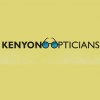Buckingham Opticians is an independent local optometrists practice dedicated to providing excellence in eyecare for both spectacle and contact lens wearers. Established in the local area for over 30 years, the practice offers expert, individual eyecare for the whole family. As a family run practice, we believe our patients deserve quality individual care and advice as well as a courteous, efficient, personal service.
We work closely with local NHS practitioners and the Yorkshire Eye Hospital to ensure you receive appropriate medical treatment when necessary. In addition to clinical optometry, Dr Buckingham taught in a leading university Optometry department for over 20 years. In that time he lectured extensively at a senior level both in this country and abroad, and authored a number of scientific papers and textbooks.
He was editor-in-chief of the scientific journal Contact Lens and Anterior Eye, and was awarded life-membership of the British Contact Lens Association (BCLA) for his contribution to contact lens practice in the UK.
We work closely with local NHS practitioners and the Yorkshire Eye Hospital to ensure you receive appropriate medical treatment when necessary. In addition to clinical optometry, Dr Buckingham taught in a leading university Optometry department for over 20 years. In that time he lectured extensively at a senior level both in this country and abroad, and authored a number of scientific papers and textbooks.
He was editor-in-chief of the scientific journal Contact Lens and Anterior Eye, and was awarded life-membership of the British Contact Lens Association (BCLA) for his contribution to contact lens practice in the UK.
Services
Buckingham Opticians provide a dedicated and highly experienced advice, fitting and aftercare service.
Dr Buckingham holds a higher diploma in contact lens practice (DCLP) as well as having been awarded life-time membership of the British Contact Lens Association (BCLA) for his contribution to contact lens practice and research.
His experience fitting contact lenses stretches over 30 years using a range of designs and materials.
It essential that contact lens wearers have correctly fitted contact lenses to maintain the health of their eyes.
Dr Buckingham holds a higher diploma in contact lens practice (DCLP) as well as having been awarded life-time membership of the British Contact Lens Association (BCLA) for his contribution to contact lens practice and research.
His experience fitting contact lenses stretches over 30 years using a range of designs and materials.
It essential that contact lens wearers have correctly fitted contact lenses to maintain the health of their eyes.
We are proud of our high standard of eyecare with comprehensive eye examinations and facilities.
Most people, particularly the short sighted, report seeing floaters that appear as little black spots or 'flies' drifting across their sight.
They move when moving the eyes and are particularly obvious looking at a plain pale background (like a cloudless sky).
Normally they are of no significance but the sudden onset of a shower of floaters, particularly after having banged your head, or if you see flashing lights in your eyes or a 'curtain' or 'veil' in front of your eyes you should seek urgent opinion.
Most people, particularly the short sighted, report seeing floaters that appear as little black spots or 'flies' drifting across their sight.
They move when moving the eyes and are particularly obvious looking at a plain pale background (like a cloudless sky).
Normally they are of no significance but the sudden onset of a shower of floaters, particularly after having banged your head, or if you see flashing lights in your eyes or a 'curtain' or 'veil' in front of your eyes you should seek urgent opinion.
Children don't have to be able to read letters before their eyes are examined.
Under normal circumstances about 3.5 years of age would be reasonable for a first eye examination and certainly before they start school.
If there is a family history of a lazy (amblyopic) eye, a squint, or needing very strong spectacles as a young child, it is vital that you take your child for an eye examination.
There is no charge for children under 16 to have their eyes examined under the NHS.
Several factors may cause a squint.
Under normal circumstances about 3.5 years of age would be reasonable for a first eye examination and certainly before they start school.
If there is a family history of a lazy (amblyopic) eye, a squint, or needing very strong spectacles as a young child, it is vital that you take your child for an eye examination.
There is no charge for children under 16 to have their eyes examined under the NHS.
Several factors may cause a squint.
Reviews

Be the first to review Buckingham Opticians.
Write a Review



